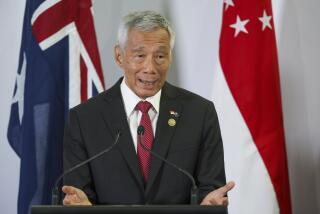Taiwan’s President Names Political Ally as New Premier
- Share via
BEIJING — Taiwan’s president named a popular lawyer and political ally today as the island’s next premier, the fifth in six years, in a bid to shore up his troubled administration and regain political momentum.
Su Tseng-chang, former chairman of the ruling Democratic Progressive Party, replaces Frank Hsieh as head of the Cabinet, President Chen Shui-bian announced at a morning news conference. Hsieh and the rest of the Cabinet will formally step down Monday.
Analysts speculate that Chen hopes the move will help secure his legacy in the final two years of an administration that has seen a string of setbacks, including a muddled cross-strait policy, a kickback scandal involving the use of foreign labor in government contracts and a poor showing in municipal elections late last year.
“This is the best choice at the worst time,” said Antonio Chiang, an independent analyst and former government advisor. “Su is a good guy, and about the last card Chen can play for premier.”
Su will not have an easy job, as the revolving door of his new office suggests. Chen is focused on -- some say obsessed with -- creating a lasting legacy and staving off lame-duck status, analysts say, at a time when his energies might be better spent worrying about his party’s candidate for the 2008 election.
The premier also faces an electorate disenchanted by the party scandals and what some see as Chen’s jagged leadership style.
“The DPP is a mess, and I’m not sure anyone taking over can make a difference,” said Chang, a 35-year-old employee in the high-tech sector in Taipei who would give only her surname.
The administration also faces increasingly sophisticated divide-and-conquer tactics from Beijing and an increasingly confident opposition under the leadership of former Taipei Mayor Ma Ying-jeou.
The departure of Hsieh, Su’s ascent and an uncompromising New Year’s speech by Chen also suggest a hardening in cross-strait relations, analysts say. Hsieh generally favored a less confrontational stance toward Beijing, while Su has taken a tougher stance, suggesting at one point that China destroy its offensive missiles instead of offering the island panda bears.
“I believe Su will follow Chen Shui-bian’s direction on cross-strait issues,” said Chiu Tai-san, former vice chairman of Taiwan’s Mainland Affairs Council, the body that oversees China relations.
Analysts say one clue to future policy may be seen in the new Cabinet appointments expected in the next few days.
“We need to see if the Cabinet members are Su’s or Chen’s,” said Xu Bodong, a Taiwan specialist at Beijing Union University. “If Su gets his choices, he may be able to have more influence.”
Taiwan and China separated in 1949. Beijing views Taiwan as a renegade province.
Su, a leading candidate for the party’s presidential nomination in 2008, is expected to walk a fine line on Taiwan’s political stage. He’ll probably remain in Chen’s shadow for the next year to secure his job and strengthen alliances, analysts say, and then gradually distance himself from Chen in the run-up to the election.
Born in southern Taiwan in July 1947, Su took an active role as a young lawyer in defending activists in the island’s then-nascent democracy movement, joining fellow attorneys Chen and Hsieh. He held several jobs in local politics through the 1980s and ‘90s, earning a reputation as an efficient administrator, excellent public speaker and devoted family man. Known for his sense of humor, he has likened his bald head to a lightbulb that helps him shine in public.
After a series of jobs in public office, including that of Taipei county commissioner, he was appointed secretary-general of the president’s office in May 2004, assuming chairmanship of the ruling party early the following year. He resigned as DPP party head last month over the poor showing in the municipal elections. In spite of being the party’s fall guy, however, his extensive efforts on behalf of local candidates were widely recognized.
Longtime associates say one of his few shortcomings has been a tendency to micromanage, although he’s become less rigid and more of a people person in the last few years as he’s assumed more central government responsibilities.
*
Times staff writer Magnier reported from Beijing and special correspondent Tsai from Taipei. Yin Lijin in The Times’ Beijing Bureau also contributed to this report.
More to Read
Sign up for Essential California
The most important California stories and recommendations in your inbox every morning.
You may occasionally receive promotional content from the Los Angeles Times.












